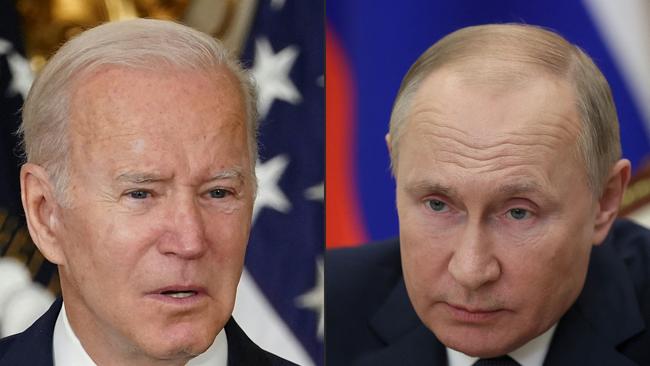Biden, Putin plan call at what US says is a ‘moment of crisis’ over Ukraine
Call will be second by the leaders this month and comes as Russia continues a military buildup near Ukraine and issues sweeping security demands.

US President Joe Biden and Russian President Vladimir Putin plan to talk on Friday AEDT ahead of high-level negotiations to deal with what one senior US official described as a “moment of crisis” over Russia’s military buildup near Ukraine’s border.
The call was requested by the Russian side, a senior Biden administration official said. It takes place as Moscow has pressed the US to rule out the expansion of the NATO to include Ukraine and Georgia and cut the alliance’s military ties with those countries and other former Soviet republics.
After weeks of diplomacy, the US and Russia this week scheduled security talks in Geneva on January 10. Even so, the Russian military has continued to maintain an intimidating military presence near Ukraine’s border despite repeated US appeals to de-escalate, American officials said.
“We are at a moment of crisis and have been for some weeks now given the Russian buildup,” the senior administration official said. “It will take a high level of engagement to address this and to try to find a path of de-escalation.”
The official said that the Biden administration sees the value in leader-to-leader talks and that the US was co-ordinating with allies and keeping them informed.
Towards that end, Secretary of State Antony Blinken spoke on Wednesday (Thursday AEDT) with Ukrainian President Volodymyr Zelensky on the upcoming diplomacy with Russia.
Some former officials see the call between Mr Biden and Mr Putin as part of a broader Russian push to rewrite the terms of the post-Cold War security arrangements in Europe and establish a sphere of influence near its periphery. “It appears to be an effort by Putin to shape the agenda for the coming talks,” said Jim Townsend, who served as a senior Pentagon official on NATO during the Obama administration. “He is taking the initiative by asking for the call,” he added.
Kremlin spokesman Dmitry Peskov played down expectations for the call. “We shouldn’t expect any breakthroughs from this conversation. This is a working conversation taking place at a very difficult moment. The escalation of tensions in Europe is unprecedented. It is extraordinary. Of course, this requires personal contact at the summit level,” Mr Peskov told the Interfax news agency.
Russia’s military buildup near Ukraine has led US and European officials to warn of a possible invasion. While Russia denies it plans an invasion, Mr Putin said he was prepared to take “military technical measures” if the West continued its “aggressive line”.
Friday’s call will be the second for the leaders this month. Following Mr Biden’s December 7 video call with Mr Putin, the US President ruled out sending combat troops to Ukraine. US officials said Mr Biden threatened to impose stiff economic sanctions, provide additional defence aid to Ukraine, and reinforce positions in NATO’s Eastern European nations if the Russian military attacked the country.
From the start, Russia has sought direct talks with the US over its demands, which it has published in two documents. The Biden administration has arranged for discussions to be carried out in three channels to try to dispel any impression that Moscow can drive a wedge between Washington and its allies.
The direct talks will take place on January 10 and are likely to be led on the US side by Deputy Secretary of State Wendy Sherman, who would meet with Russian deputy Foreign Minister Sergey Ryabkov. Those discussions are to be followed on January 12 by talks in Brussels in the NATO-Russia Council. The next day, talks are to be hosted by the Organisation for Security and Co-operation in Europe of which Ukraine is a member.
No sign has emerged that the two sides have been able to narrow their differences concerning Moscow’s demand that NATO sever its military ties to Ukraine and Georgia, and rescind past statements that they eventually would join the alliance.
The administration official said a reversal of the Russian buildup wasn’t a precondition for negotiations but would establish a productive atmosphere for the talks.
“Concrete progress is naturally connected to de-escalation,” said the official, who added the Russian presence near Ukraine wasn’t static and “remains a continuing source of grave concern”.
The US estimates Russia has massed 100,000 troops near Ukraine and projects they could reach 175,000 for an invasion.
The Wall Street Journal



To join the conversation, please log in. Don't have an account? Register
Join the conversation, you are commenting as Logout